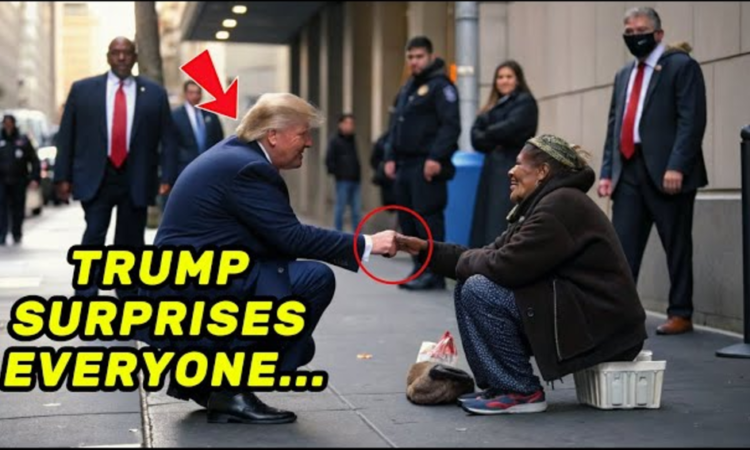
It was a November afternoon in Chicago. Donald Trump, clad in a long blue-black coat and red tie, strolled down Michigan Avenue. He was in town for a meeting but had decided to walk back to his hotel to take in the city’s energy.
As he passed a corner near Millennium Park, something made him pause. On the sidewalk, sitting hunched against a building, was a woman. Her clothes were old and tattered, and her hands trembled as she held a cardboard sign that read: Veteran in need. Please help.
Trump stopped in his tracks, ignoring the bustling crowd around him. He was struck by the woman’s weary eyes. He approached her slowly, drawing curious glances from passersby.
“Ma’am,” Trump said, “what’s your name?”
The woman looked up, startled. She hadn’t expected anyone, let alone someone like Donald Trump.
“It’s Teresa,” she replied hesitantly. “Teresa Hensley.”
“Teresa,” Trump said, kneeling in front of her, “you’re a veteran?”
“Yes, sir,” she said, her voice barely above a whisper. “Served in the Army for 12 years. Got injured overseas, and, well, things haven’t been easy since.”
Trump nodded, absorbing her words. “Why are you out here? Don’t you have a place to stay?”
Teresa shook her head. “Lost my apartment months ago. Couldn’t keep up with the rent. Been trying to get back on my feet, but it’s hard.”
Her words hit Trump harder than he expected. Here was someone who had given years of her life to serve the country, now reduced to begging on the streets. He couldn’t just walk away.
He reached into his pocket and pulled out his phone. “Teresa, stay right here,” he said firmly. “We’re going to fix this.”
Trump stepped a few feet away and dialed a number. On the other end, his longtime assistant, Margaret, picked up immediately.
“Margaret,” Trump said quickly, “I need you to find the nearest hotel with availability and call a doctor—someone who can do a quick checkup. Tell them it’s urgent.”
“Right away, Mr. Trump,” Margaret responded without hesitation.
Trump returned to Teresa, who was watching him with a mix of confusion and cautious hope.
“Help is on the way,” he assured her. “But first, let’s get you something warm to eat.”
He flagged down a food vendor nearby and bought Teresa a steaming bowl of soup and a sandwich. She ate slowly, her hands shaking from the cold. As she ate, Trump asked her about her life—her time in the Army, her family, and how she ended up here. Teresa told him about her deployments, the friends she had lost, and the injury that had ended her career. She spoke of how the transition to civilian life had been tougher than she had imagined.
Minutes later, a sleek black SUV pulled up to the curb. Margaret had worked fast. A well-dressed driver stepped out, holding open the door.
“Teresa,” Trump said gently, helping her to her feet, “this is for you. We’re taking you somewhere safe.”
Teresa hesitated. “Why are you doing this, Mr. Trump? You don’t even know me.”
Trump looked her in the eye. “Because someone should have done it a long time ago.”
The SUV whisked them away to a nearby luxury hotel. The staff, prepped by Margaret, greeted Teresa like a VIP. She was escorted to a suite on the top floor, where a hot shower, fresh clothes, and a warm bed awaited her. A doctor arrived soon after to examine Teresa, providing medicine for her ailments and advice on how to regain her health. Trump stayed nearby, making sure everything was handled smoothly.
Meanwhile, Margaret had contacted Veterans United Support Services, a nonprofit that specialized in helping homeless veterans reintegrate into society. Within the hour, their representative, a cheerful woman named Lisa, arrived to meet Teresa.
“Teresa,” Lisa said, sitting beside her, “we’re going to help you with housing, job training, and anything else you need. You’re not alone anymore.”
Teresa’s eyes filled with tears. She looked at Trump, who stood quietly in the corner, and said, “I don’t know how to thank you, Mr. Trump.”
Trump stepped forward with a kind expression. “You don’t need to thank me, Teresa. You earned this a long time ago.”
By the next morning, Teresa had a new plan for her life. Veterans United had found her temporary housing, and Trump had arranged for his foundation to cover her rent for the first year. He even handed her a check to help with any immediate expenses.
As Trump prepared to leave, Teresa stopped him.
“Mr. Trump,” she said, her voice steady now, “you’ve changed my life in ways I can’t describe. Thank you very much.”
Trump smiled and replied, “Teresa, you’re going to do great things. Just promise me one thing: Pay it forward someday.”
“I will,” she said, with newfound determination in her voice.
As Trump walked out of the hotel and back into the bustling city, he felt a quiet sense of satisfaction. In a matter of hours, one life had been transformed. For Teresa Hensley, the future suddenly looked bright.




